Daily Archives: October 22, 2018
HAF and Al Akhawayn University Plant Trees with Communities in Azrou

The HAF-Fes Team organized last Sunday a tree planting event at Azrou, with students from Al Akhawayn University and the village association at Ain Aghbal. One of the professors from Al Akhawayn University, Dr. Duncan Rinehart, participated in the day. Professor Rinehart is a former colleague of HAF President Yossef Ben-Meir, when he was a
HAF Thanks Ecosia
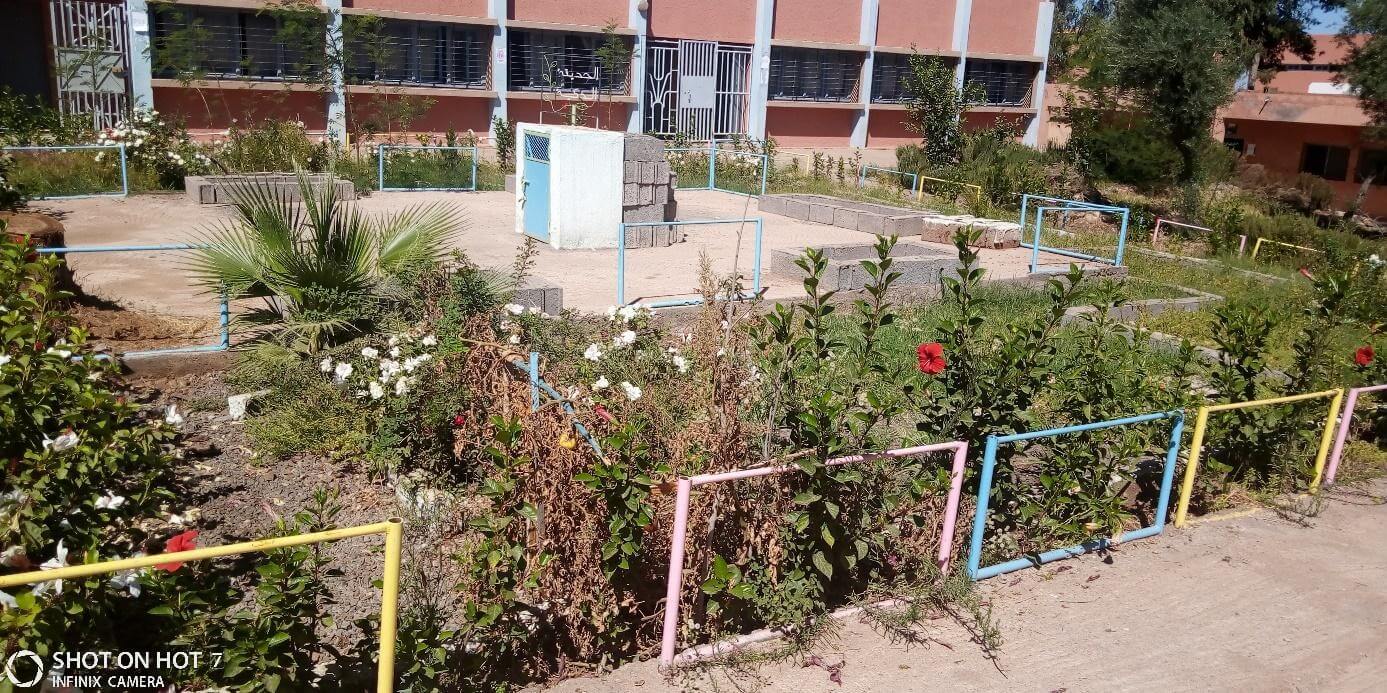
Ecosia, a social business based in Germany, has made green, empowering, sustainable, and soon a prosperity-generating difference with farming families and schools in 23 provinces of the Kingdom of Morocco. A wonderful partner, Ecosia is enabling the fulfillment of true Moroccan stories of youth finding opportunity, women’s greater agency, diverse partnership, multiculturalism, natural restoration, and
TREES for a FRUITFUL FUTURE
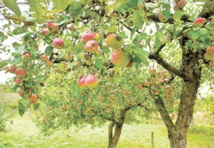
By Mohamed Abdel-Rahman, Ph.D. USAID-HAF Farmer-to-Farmer Volunteer Marrakech The Farmer to Farmer (F2F) program is a USAID development initiative that is implemented throughout the world. During the past 20 years, I had the opportunity to volunteer for 80 assignments in 14 countries. In Morocco, the F2F program is administered by Land O’Lakes International Development (LOL),
HAF invests in UCA students to spread the participatory approach in Morocco

By Errachid Montassir HAF Project Manager The growth of sustainable development as a mainstream concept and practice in Morocco has been progressing but not as much as most people (particularly rural, and women and youth everywhere) have hoped. Morocco has progressive and helpful laws and programs that give the opportunity and responsibility to all communities
Visionnaires d’hier et d’aujourd’hui
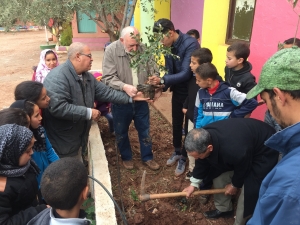
Un voyage récent au Maroc a été ma dix-septième mission de bénévolat avec le programme « Farmer to Farmer » de l’USAID. Ce qui a fait que celui-ci est différent, c’est que l’horizon temporel se déroulera sur des décennies, par opposition à des semaines et des mois. L’ingéniosité individuelle et de groupe crée un paysage d’arbres, tout
HAF joins the Delegation of Education in Chichaoua for Earth Day event hosted by high school students

By Eliana Lisuzzo HAF Program Assistant — Just as every other nation in the world, Morocco faces consequences of climate change including higher temperatures, more extreme weather conditions, and rising sea levels due to the human population’s collective treatment of our earth. Morocco particularly struggles with waste management and rising urban air pollution. Without implementing
Developing Capability for Seed Storage and Preservation in Morocco

Developing Capability for Seed Storage and Preservation in Morocco By Russ Zick USAID Farmer-to-Farmer Volunteer Small holder farmers in Morocco are engaged in upgrading their agricultural practices in order to increase income by expanding exports to Europe, the United States, and other Southern countries. The High Atlas Foundation (HAF) has been engaged in that process
High Atlas Foundation and MEPI in Oujda

On February 20, in partnership with the Middle East Partnership Initiative, HAF in Oujda conducted the first capacity-building workshop in the training room of Midar Agricultural Training Center located in the city of Midar, in the province of Driouch. This session knew presence of 19 participants men and women representing ten cooperatives from different areas
HAF 1 of 10 civil society organizations participating in training on digital security

By Fatima Zahra Laaribi Financial Manager and Trainer I had the honor of taking part in the 1st Maghreb Training of Trainers on Digital Security. The High Atlas Foundation was selected out of 95 associations from all over the Maghreb to further strengthen its capacities as a non-profit organization in the safe use of technology
Conserving Traditional Crop Diversity and Wild Medicinal Plants in Morocco

– Conserving Traditional Crop Diversity and Wild Medicinal Plants in Morocco, by Abderrahim Ouarghidi (Agricultural Expert), Worldstage, 21 May 2018. • Arabic: Al-Watan Voice, 12 May 2018. Morocco is a key producer of fruits and vegetables for global markets thanks to the government’s push for commercialized crop production – but at what cost? This article explores how “modern” crops
2018 HAF Moroccan milestone: 1.4 million trees and seeds planted

By Eliana Lisuzzo HAF Program Assistant — An old Moroccan proverb, “One hand can’t clap,” is one that embodies both the approach to and application of the work implemented by The High Atlas Foundation (HAF). HAF is made up of a team of people dedicated to empowering Moroccans by engaging them in the process of
Experience at Cadi Ayyad University

By Fatime Zahra Machloukh Student at Cadi Ayad University When we talk about Cadi Ayyad University, we are talking about a history, which involves a long period of hard work and great efforts. The eclectic student population is the best part of this University, since it comes from different places, with different ideas, goals, ambitions
Iftar, 2018

For most people who are familiar with Islam, they are aware that Ramadan is a holy month; that it consists of fasting from sunrise to sunset. However, Iftar is not simply the breaking of fast. It is also a time when friends and family can gather in celebration. On May 26th, current and previous HAF staff and volunteers
From Transit to Integration: A Moroccan Initiative for Community Development
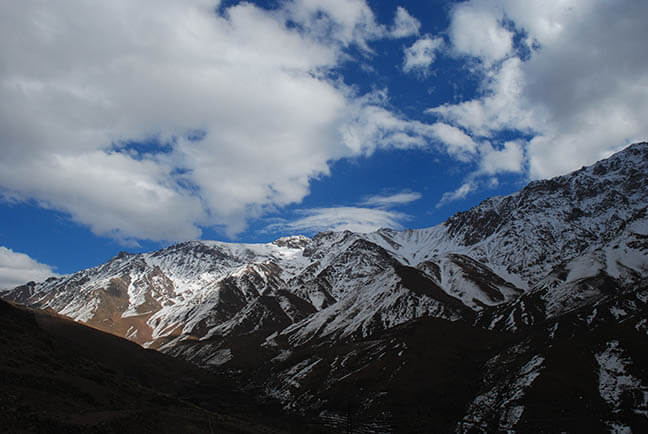
– From Transit to Integration: A Moroccan Initiative for Community Development, Morocco World News, by Nathan Park (Undergraduate student and HAF Intern), 31 May 2018. • Arabic: Marrakech 24, 12 June 2018. By Nathan Park HAF Intern International migration from sub-Saharan Africa towards Europe and the United States has significantly increased over the past decade. These migration trends, especially
Experiencing ‘Imagine’ Women’s Empowerment

By Salma Chamikhe and Gal Kramarski HAF Interns Women from mountain villages took part in the IMAGINE initiative as they participated in the 4-day empowerment workshops in their home communities and at the High Atlas Foundation’s office in Marrakech, Morocco. The men-free zone boosted the women’s ability to candidly share their feelings as they answered
The Cogwheel of Sustainability in the High Atlas

By Salim Syassi HAF Intern and Student at Al Akhawayn University Anamer and Aghbalou may seem to be two typical villages in the mountainous Al Haouz province of Morocco, but they embody exceptional efforts of participatory development led by the High Atlas Foundation (HAF), local communities, and the High Commission of Waters and Forests. As
New Voices to the Old: Sprouting Progress in Marrakech’s Mellah
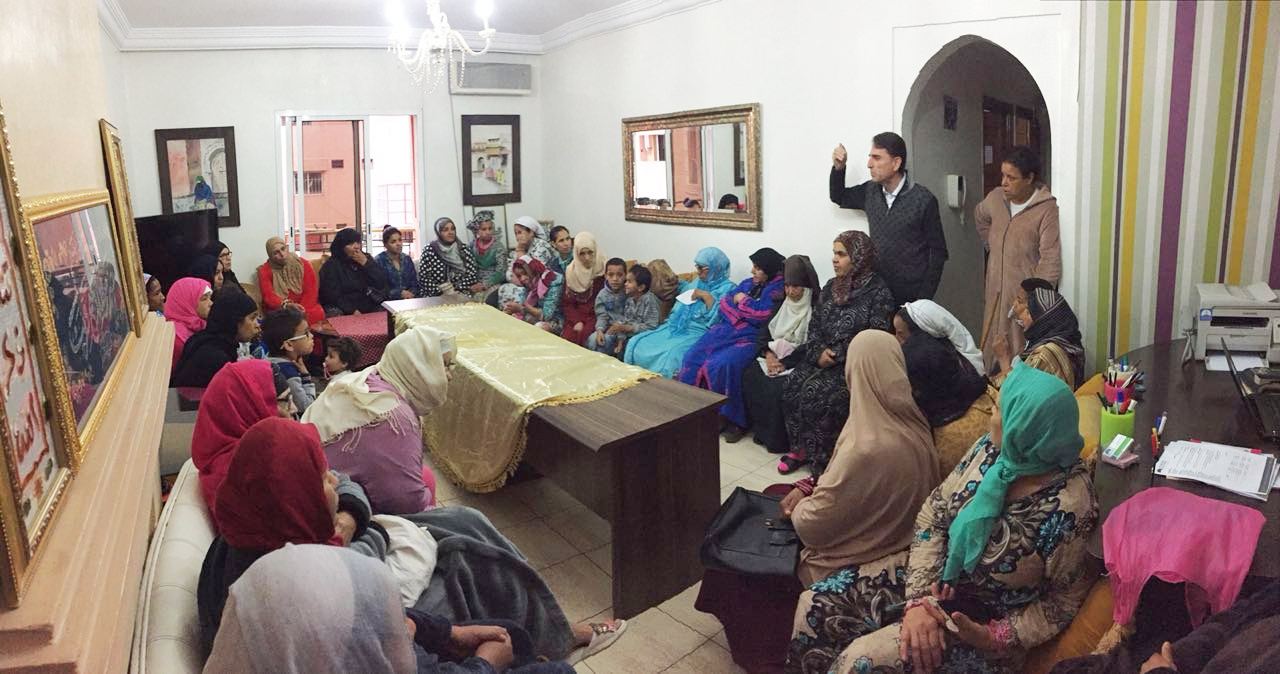
By Aichatou Haidara Aanya Salot HAF Interns On the 24th of May, the office of the High Atlas was brimming with a total of 91 people as the High Atlas Foundation staff and the people of Marrakech’s Mellah gathered for Iftar, the breaking of fast. Marrakech’s Mellah proves to be a religious and geographical testimony to the historic
Unlocking the Potential of the Women of Ourika Valley

The women of the Ourika commune and HAF Project Manager Amina El Hajjami (second from left) By Katie O’Neill, HAF Intern from Claremont McKenna College (USA) High Atlas Foundation, Marrakech In the village commune of Ourika, Morocco a women’s cooperative successfully cultivates vast fields of calendula flowers. Though in this part of the world patriarchal
OPTIMISM FOR RIVER MANAGEMENT WITH THE TASSA OUIRGANE COMMUNITY

By Julia Payne HAF Intern On Monday June 4, 2018, we took the snaking roads through the High Atlas Mountains to the Tassa Ouirgane community nestled between two towering mountains in the Toubkal National Park. The purpose of the day’s visit was to have the community participate in a training workshop on how to manage
Investment in Sami’s Project Swiftly Transforming Communities

By Julia Al-Akkad HAF Intern The High Atlas Foundation’s initiation of Sami’s Project in 2011 led to remarkable success throughout the rural communities of the Kingdom of Morocco. The sustainable development project seeks to improve the education system by creating green spaces through distributing and planting trees at local schools. The green spaces encourage the


